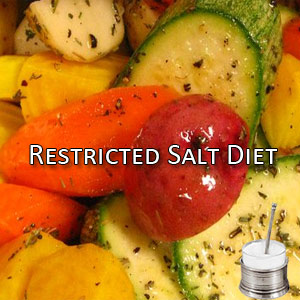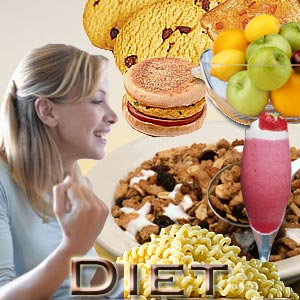Restricted Salt Diet

Sodium is the body's chief electrolyte. It plays a significant role in the maintenance of fluid electrolyte balance at the cellular level. Many organ systems such as muscular system, nervous system are associated with the electrolytic function of sodium. Sodium is predominantly found in the fluid connective tissue blood and lymph. Sodium helps in the regulation of blood pressure and blood volume.
The adrenal glands help in the regulation of sodium levels in the body through the hormone aldosterone. The predominant source of sodium is obtained in the form of sodium chloride also known as common salt. The other sources include food products containing sodium carbonate.
In addition to these sources, medications such as laxatives, anti-inflammatory drugs of non-steroidal origin and also antacids contain high amounts of sodium concentrations.
Those suffering from hypertension or kidney problems are often prescribed a low sodium diet. It is indeed not so difficult to follow a restricted salt diet. Look up our helpful tips.
Processed foods
Processed foods contain increased amount of sodium to enhance the taste and also to act as preservative. The types of preservatives may include sodium carbonate, monosodium glutamate, sodium benzoate and sodium nitrate. For many economic reasons, sodium is included in processed foods to increase the shelf life of the product. Other reasons for this are to prevent the growth of food associated pathogens.
Recommended quantity of sodium intake
The recommended intake of sodium under restricted sodium intake is 2 grams or 2,400 milligrams. Examine the label on packaged foods or processed foods for sodium concentration. Fresh foods are recommended over processed foods for added health benefits. Eating habits have to be continuously monitored along with the lifestyle.
Complications of high sodium intake
High sodium levels in the body can lead to many health complications, according to the American Heart Association. Research pertaining to this subject has unveiled many critical health scenarios which were based on the increased sodium intake. Health complications related to increased sodium intake include hypertension, congestive heart failure, cirrhosis of liver, renal disease etc.
Hypertension related to high sodium intake is due to increased water absorption and fluid retention by the kidneys. Another risk factor related to this condition is with diabetic patients. Apart from these conditions hypertension related to high sodium intake is more prevalent among individuals who have lifestyles associated with alcohol consumption, lack of exercise, obesity and also stress eating.
Foods containing high sodium content
Packaged foods such as pastas, potato chips, snacks, crackers, instant soup preparations and baked items are predominant sources of high sodium content. In addition to these, canned foods, pickles, ketchups, milk products such as cheese, butter milk, processed dairy products also contain high sodium concentrations. Meat products such as salami, bacon, dried meat, soaked meat, smoked meat and fish, salad dressings contain high percentage of sodium.
Restricted sodium diet
- Remove the salt shaker from the dining area.
- Avoid the use of monosodium glutamate and soy sauce.
- Check labels carefully while shopping; especially for pasta sauces, canned vegetables and cereals.
- Balance your diet with potassium rich foods.
- Choose fresh foods over processed or packaged foods.
- Rinse canned or frozen foods before using them. Canned tuna, frozen vegetables etc are best drained and rinsed before steaming or boiling.
- Use herbs and spices to create interesting flavors with restricted salt.
- Instant foods or convenience foods are often high in sodium. Look for low sodium brands.
Top of the Page: Restricted Salt Diet
Tags:#restricted salt diet #restricted sodium diet

Therapeutic Lifestyle Changes Diet
Intermittent Fasting Plan
Flexitarian Diet
Dukan Diet Plan
Diet Plateau
High Protein Diet
Elimination Diet
Raw Food Diet
Paleo Diet
Liver Cleansing Diet
Intermittent Fasting Diet
Low Fat Low Cholesterol Diet
Low Carb Diet
Vegan Diet Plan
Hay Diet
Sacred Heart Diet
Heart Attack Diet
Diet after Gastric Bypass
RICE Diet
Gluten Free Diet
Acid Reflux Diet
Detox Diet
Sonoma Diet
Glycemic Index Diet
Montignac Diet
Diabetic Diet Plan
Healthy Breastfeeding Diet
Negative Calorie Diet
Fad Diet
Blood Group Diet
Diverticulitis Diet
DASH Diet
Ornish Diet
3 Day Diet Strategy
Ketogenic Diet
Zone Diet Plan
Anti Aging Diet
South Beach Diet
Gall Bladder Diet
Low Cholesterol Diet
Low Sodium Diet
Diet and Kidney Disease
Scarsdale Diet Plan
Macrobiotic Diet
Osteoarthritis Diet
Depression Diet Plan
Migraine Diet
Restricted Salt Diet
Gout Diet
Rotation Diet
Diet Cancer Patient
Ways to better Health

Boost Metabolism
BMI Calculator
Low Fat Dessert
Whey Protein
Diet and Fitness
Fitness Exercise Articles
Cardio Workout
Aerobics
Yoga
Body Toning
Top of the Page: Restricted Salt Diet
Popularity Index: 101,864

